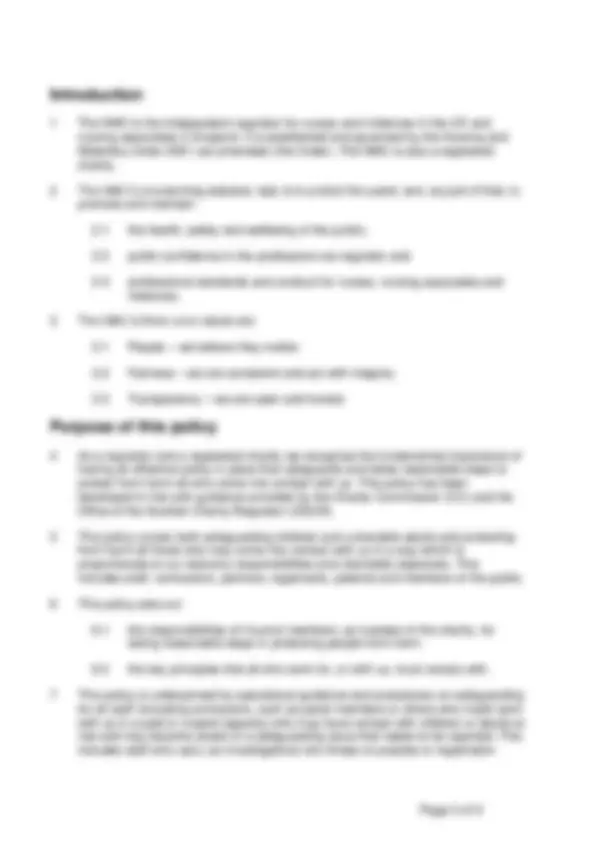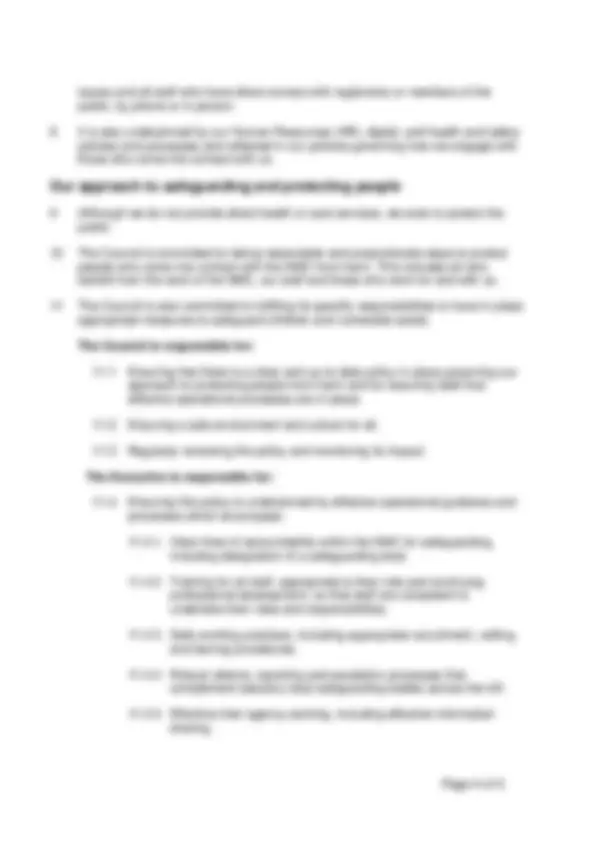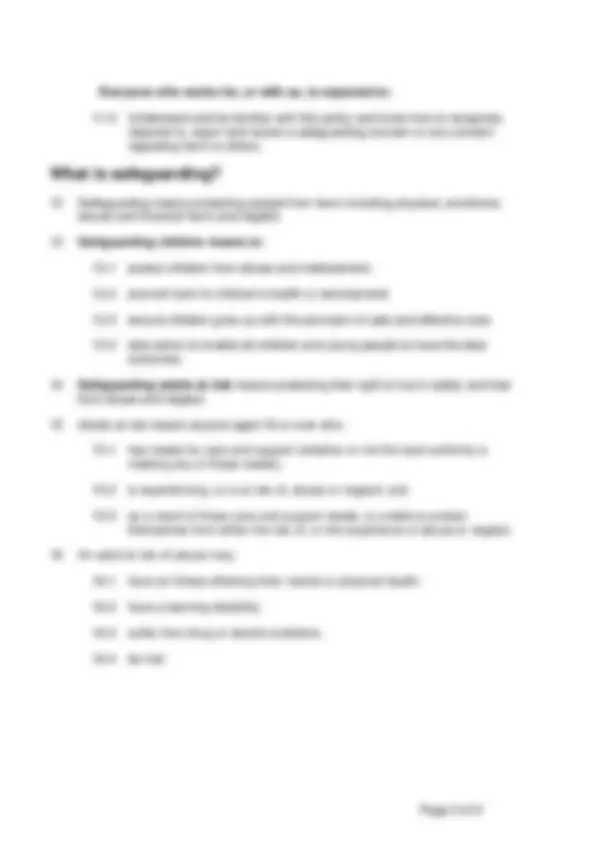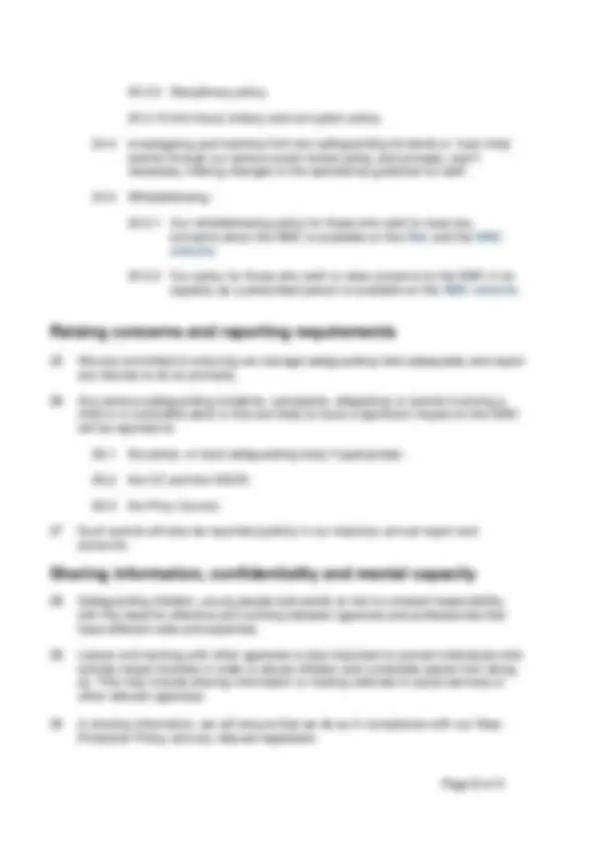







Study with the several resources on Docsity

Earn points by helping other students or get them with a premium plan


Prepare for your exams
Study with the several resources on Docsity

Earn points to download
Earn points by helping other students or get them with a premium plan
Community
Ask the community for help and clear up your study doubts
Discover the best universities in your country according to Docsity users
Free resources
Download our free guides on studying techniques, anxiety management strategies, and thesis advice from Docsity tutors
The Nursing and Midwifery Council's (NMC) policy on safeguarding and protecting people, including children and vulnerable adults, from harm. The policy covers the responsibilities of council members and staff, key principles, and operational guidance. It also includes information on safeguarding induction and training, reporting requirements, and digital and data protection policies.
What you will learn
Typology: Schemes and Mind Maps
1 / 9

This page cannot be seen from the preview
Don't miss anything!






Title Safeguarding and Protecting People Policy
Summary This policy applies to all who work for or with the NMC, including
Council, Committee and Panel members, staff and contractors
Approval Approved by the Council November 2018
Policy Owner Secretary to the Council
Review date November 2019
issues and all staff who have direct contact with registrants or members of the public, by phone or in person.
8 It is also underpinned by our Human Resources (HR), digital, and health and safety policies and processes and reflected in our policies governing how we engage with those who come into contact with us.
9 Although we do not provide direct health or care services, we exist to protect the public.
10 The Council is committed to taking reasonable and proportionate steps to protect people who come into contact with the NMC from harm. This includes all who benefit from the work of the NMC, our staff and those who work for and with us.
11 The Council is also committed to fulfilling its specific responsibilities to have in place appropriate measures to safeguard children and vulnerable adults.
The Council is responsible for:
11.1 Ensuring that there is a clear and up-to-date policy in place governing our approach to protecting people from harm and for assuring itself that effective operational processes are in place.
11.2 Ensuring a safe environment and culture for all.
11.3 Regularly reviewing the policy and monitoring its impact.
The Executive is responsible for:
11.4 Ensuring this policy is underpinned by effective operational guidance and processes which encompass:
11.4.1 Clear lines of accountability within the NMC for safeguarding, including designation of a safeguarding lead.
11.4.2 Training for all staff, appropriate to their role and continuing professional development, so that staff are competent to undertake their roles and responsibilities.
11.4.3 Safe working practices, including appropriate recruitment, vetting and barring procedures.
11.4.4 Robust referral, reporting and escalation processes that complement statutory local safeguarding bodies across the UK.
11.4.5 Effective inter-agency working, including effective information sharing.
Everyone who works for, or with us, is expected to:
11.5 Understand and be familiar with this policy and know how to recognise, respond to, report and record a safeguarding concern or any concern regarding harm to others.
12 Safeguarding means protecting people from harm including physical, emotional, sexual and financial harm and neglect.
13 Safeguarding children means to:
13.1 protect children from abuse and maltreatment.
13.2 prevent harm to children’s health or development.
13.3 ensure children grow up with the provision of safe and effective care.
13.4 take action to enable all children and young people to have the best outcomes.
14 Safeguarding adults at risk means protecting their right to live in safety and free from abuse and neglect.
15 Adults at risk means anyone aged 18 or over who:
15.1 has needs for care and support (whether or not the local authority is meeting any of those needs);
15.2 is experiencing, or is at risk of, abuse or neglect; and
15.3 as a result of those care and support needs, is unable to protect themselves from either the risk of, or the experience of abuse or neglect.
16 An adult at risk of abuse may:
16.1 have an illness affecting their mental or physical health.
16.2 have a learning disability.
16.3 suffer from drug or alcohol problems.
16.4 be frail.
23.2 Embedding safeguarding in the NMC’s culture so that it is safe for anyone affected to come forward and report incidents and concerns with the assurance that they will be handled sensitively and properly.
23.3 Guidance for dealing with safeguarding concerns, including:
23.3.1 identification and management of risk;
23.3.2 management of reports of incidents, allegations and risk and recording and retention requirements;
23.3.3 reporting requirements to the relevant authorities such as the police, social services and the CC and OSCR; and
23.3.4 making changes to reduce the risk of any further incidents.
23.4 Advice if a member of staff is accused of abuse.
23.5 Guidance when dealing with wider welfare concerns and when to liaise with the Public Support Service (PSS) within the Fitness to Practise directorate.
24 We also have systems in place for:
24.1 ensuring Council and partner members and key staff are not subject to any CC disqualifications.
24.2 the safe recruitment and selection of staff, including reviewing whether any posts should have a Disclosure and Barring Services (DBS) check or a criminal record check from Disclosure Scotland.
24.3 dealing with allegations or concerns relating to staff, including clear lines of accountability, systems of reporting and actions to be taken. The following policies are already in place:
24.3.1 Codes of Conduct for Council and Committee members and independent Panel members.
24.3.2 Dignity at work policy.
24.3.3 Grievance policy.
24.3.4 Health and safety policy.
24.3.5 Digital policy.
24.3.6 Data protection policy (including confidentiality policy).
24.3.7 Complaints policy.
24.3.8 Equality, diversity and inclusion framework.
24.3.9 Disciplinary policy.
24.3.10 Anti-fraud, bribery and corruption policy.
24.4 investigating and learning from any safeguarding incidents or ‘near miss’ events through our serious event review policy and process, and if necessary making changes to the operational guidance for staff.
24.5 Whistleblowing:
24.5.1 Our whistleblowing policy for those who wish to raise any concerns about the NMC is available on the iNet and the NMC website.
24.5.2 Our policy for those who wish to raise concerns to the NMC in its capacity as a prescribed person is available on the NMC website.
25 We are committed to ensuring we manage safeguarding risks adequately and report any failures to do so promptly.
26 Any serious safeguarding incidents, complaints, allegations or events involving a child or a vulnerable adult or that are likely to have a significant impact on the NMC will be reported to:
26.1 the police, or local safeguarding body if appropriate;
26.2 the CC and the OSCR;
26.3 the Privy Council.
27 Such events will also be reported publicly in our statutory annual report and accounts.
28 Safeguarding children, young people and adults at risk is a shared responsibility, with the need for effective joint working between agencies and professionals that have different roles and expertise.
29 Liaison and working with other agencies is also important to prevent individuals who actively target charities in order to abuse children and vulnerable adults from doing so. This may include sharing information or making referrals to social services or other relevant agencies.
30 In sharing information, we will ensure that we do so in compliance with our Data Protection Policy and any relevant legislation.